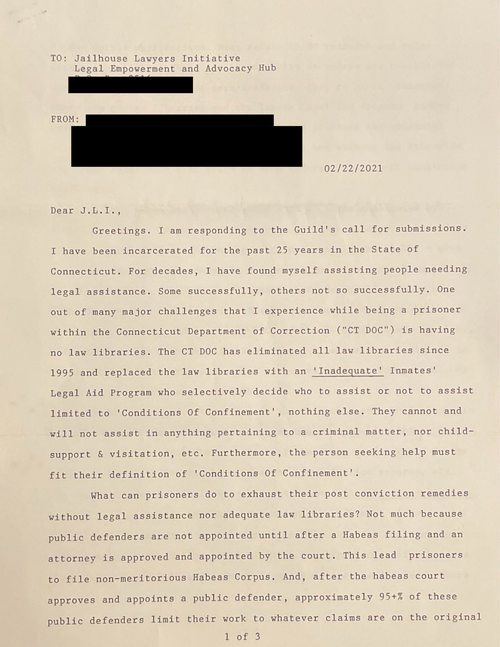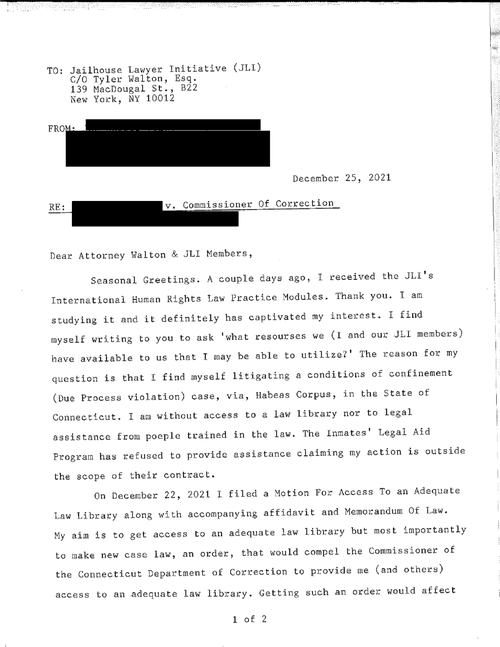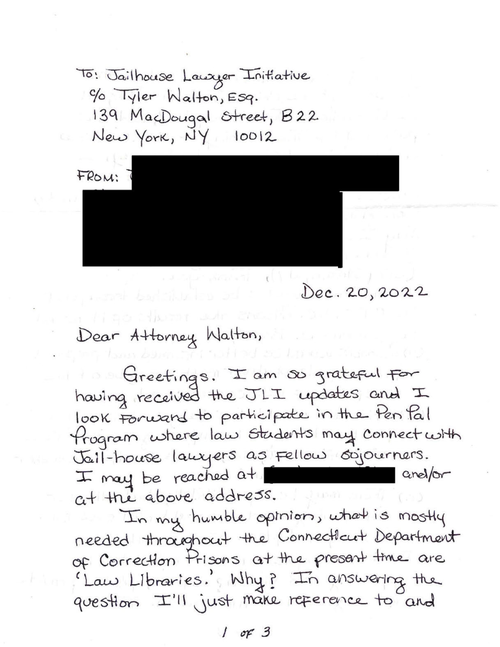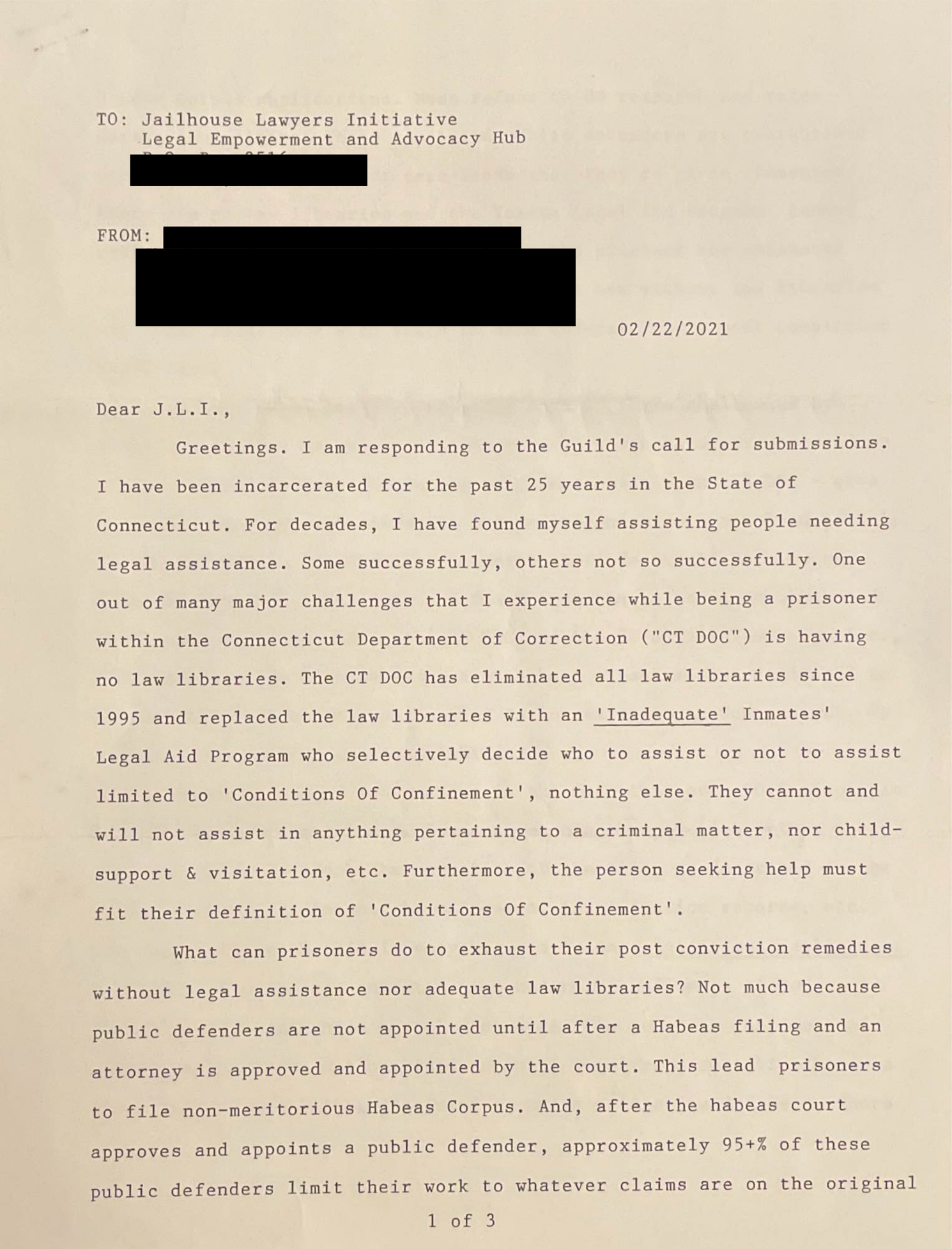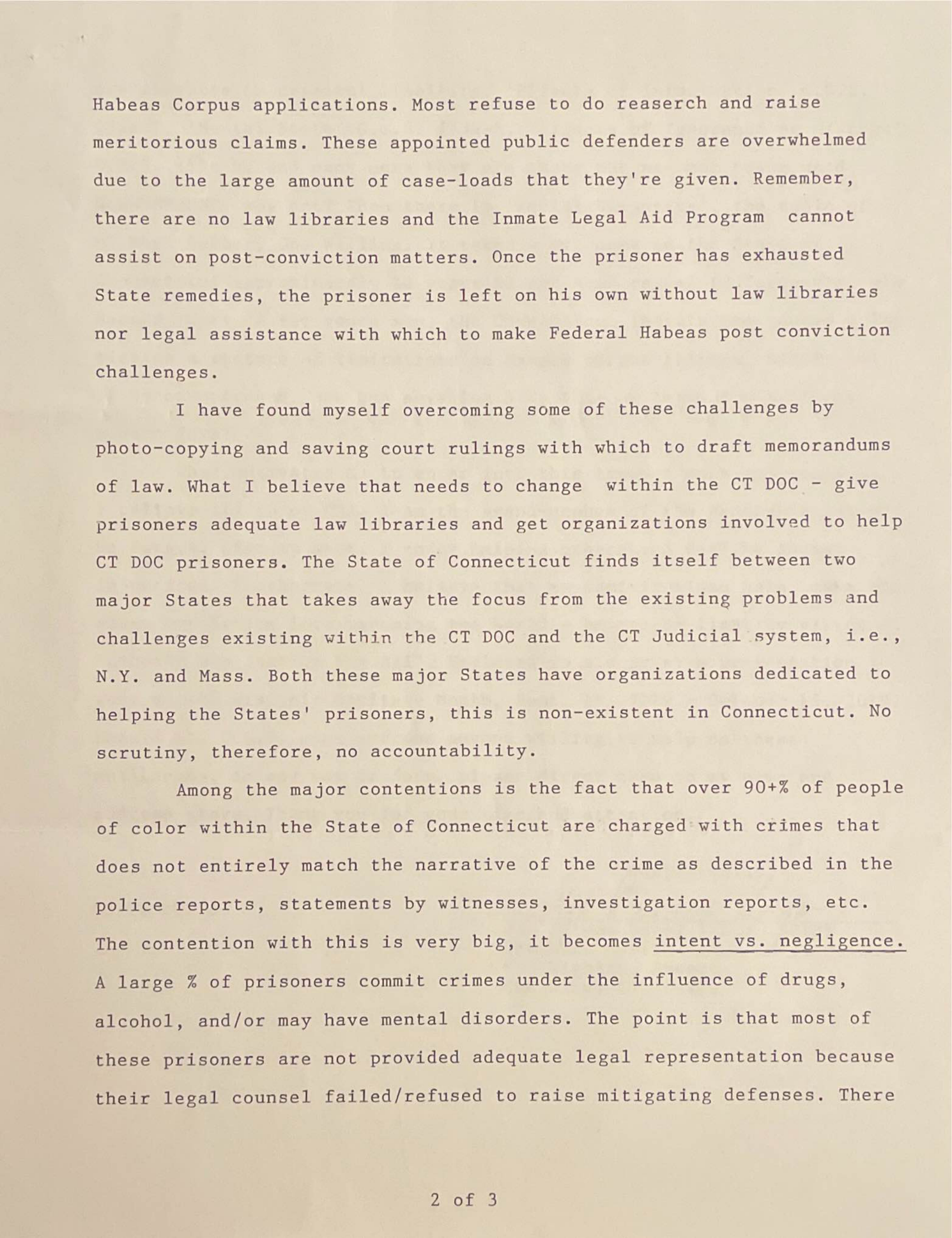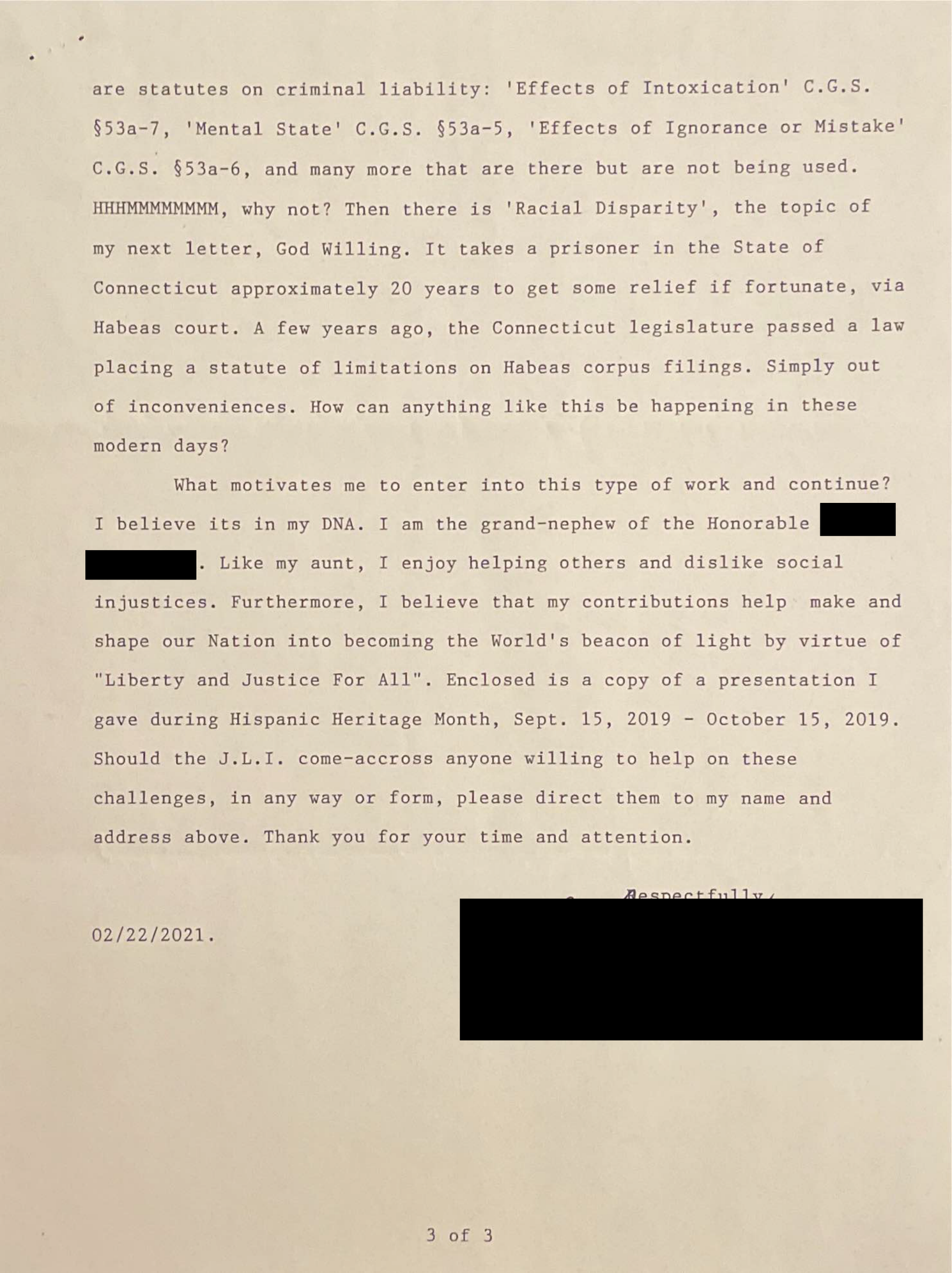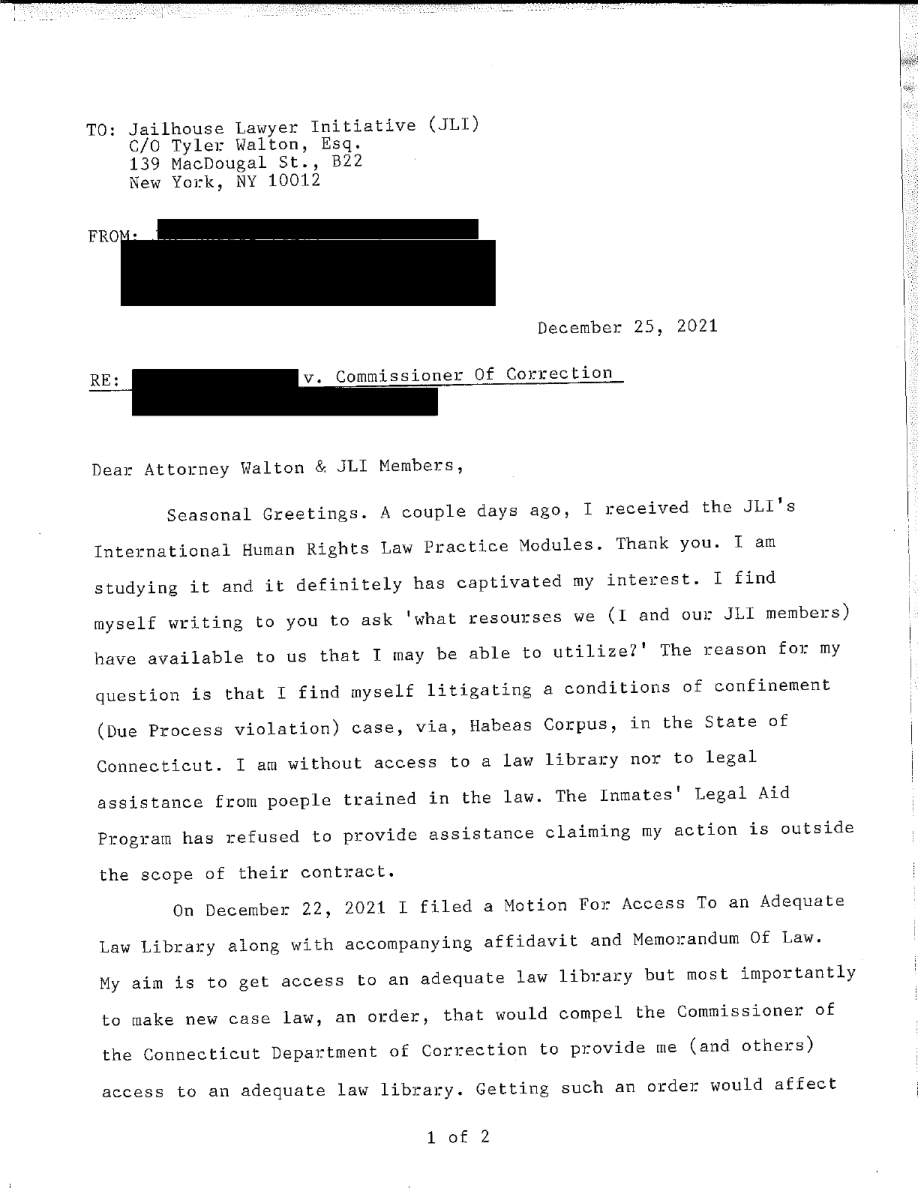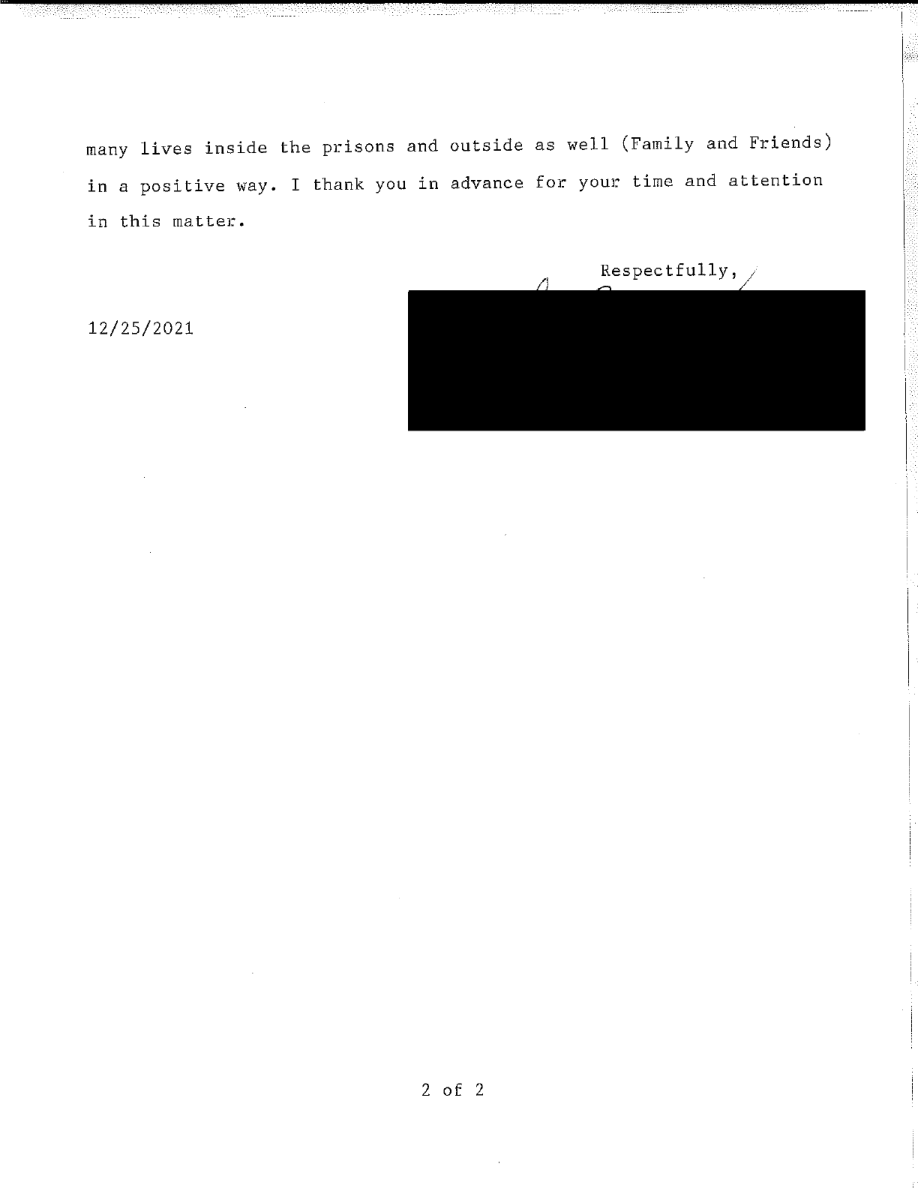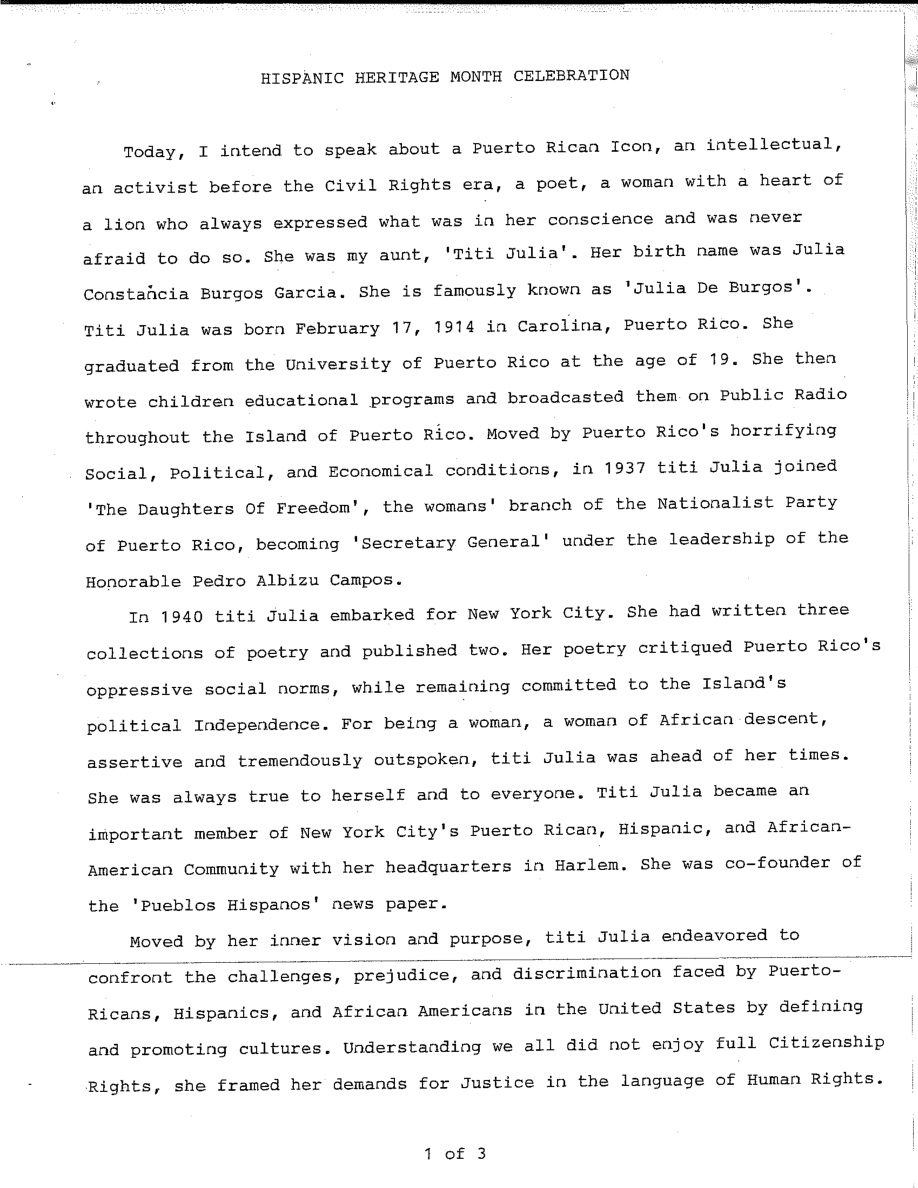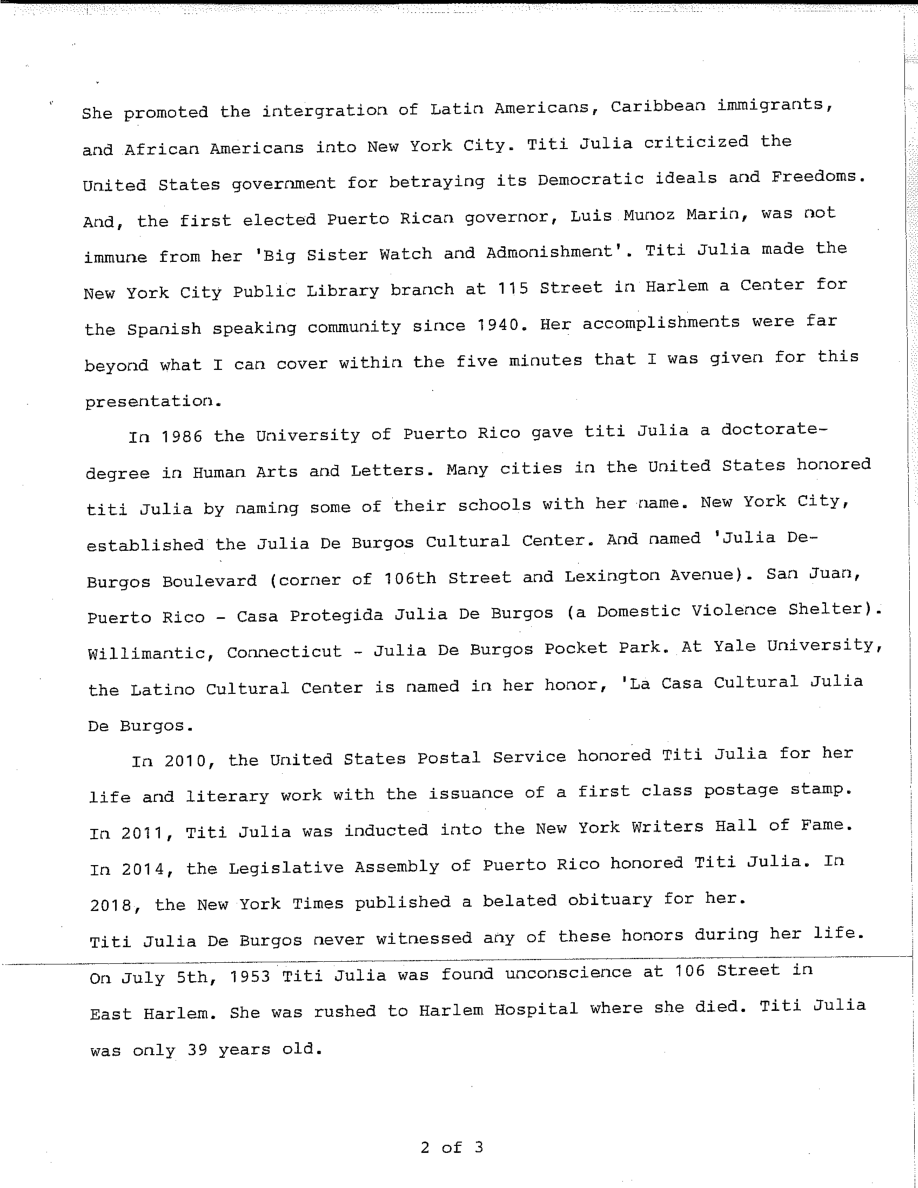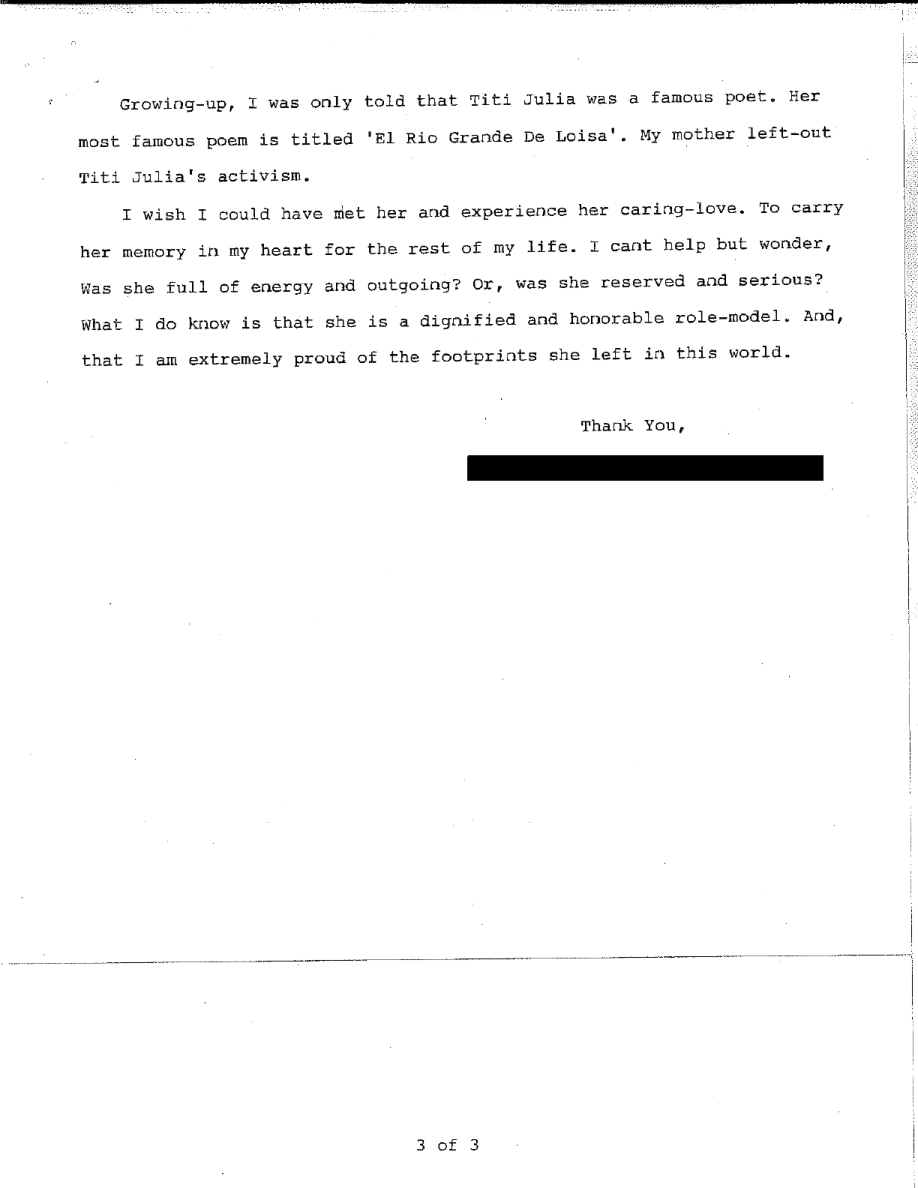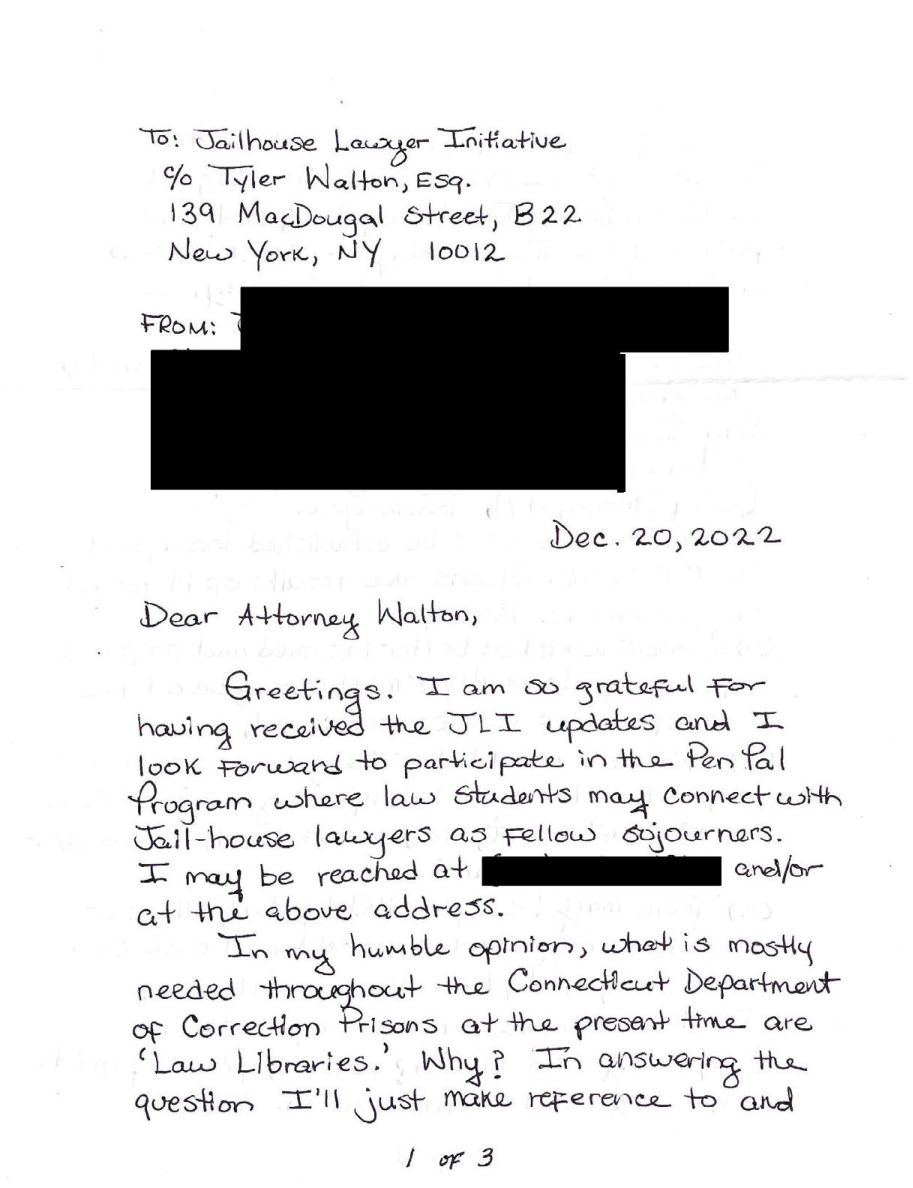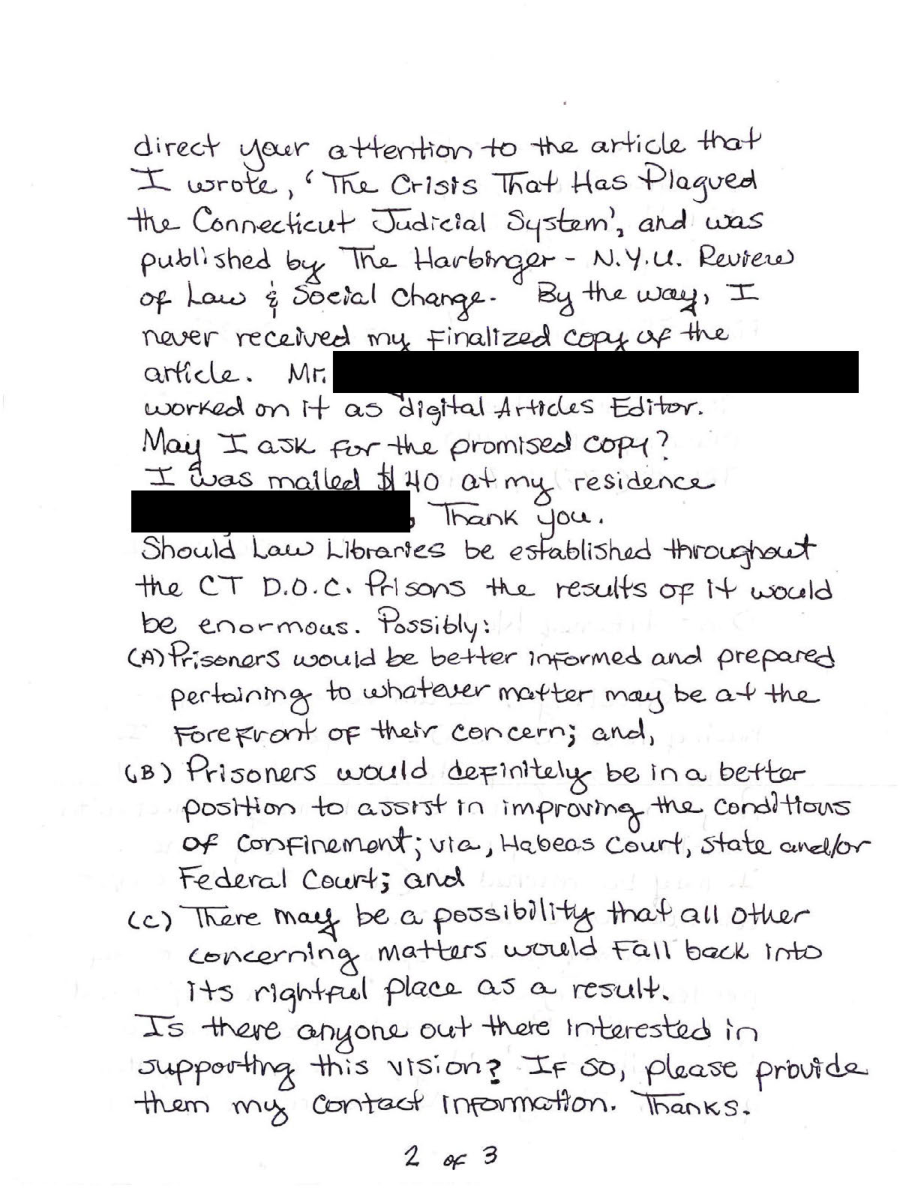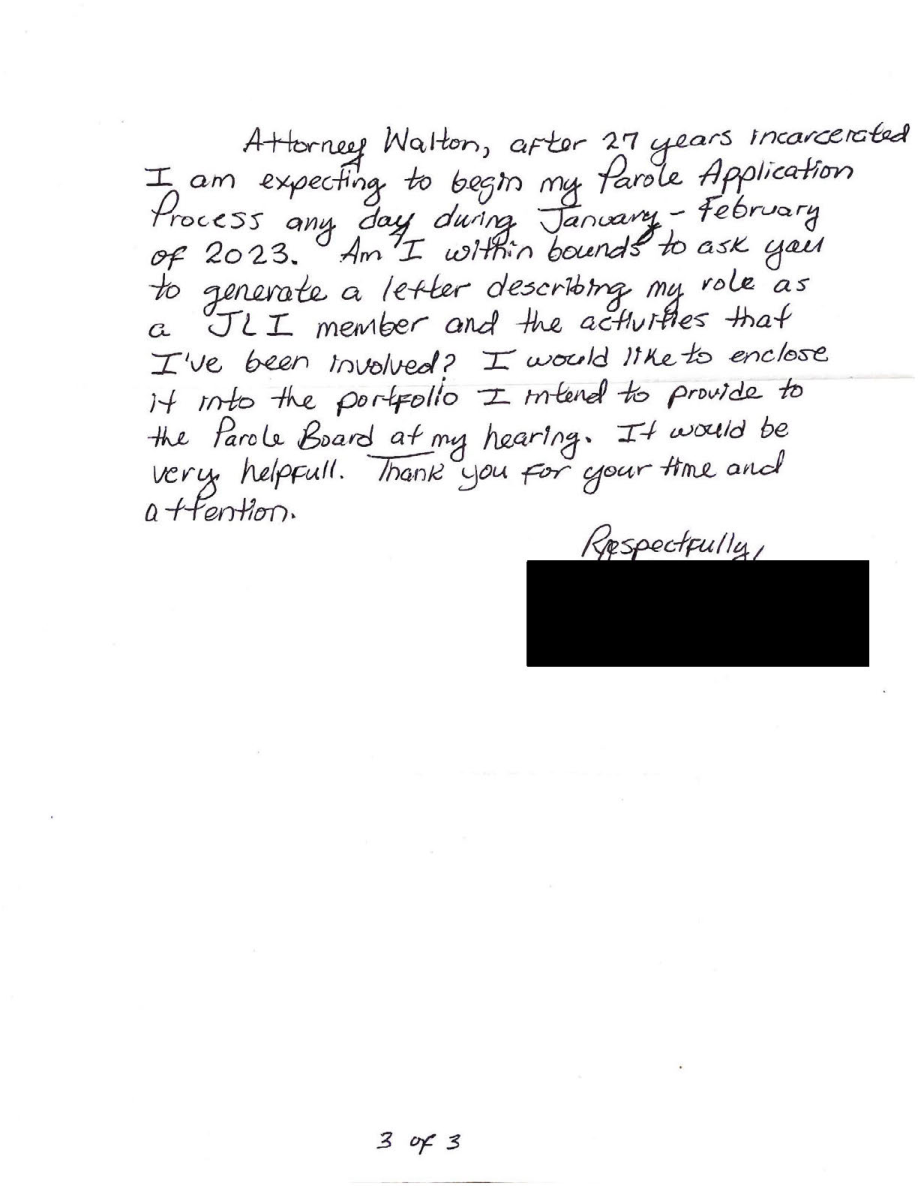Amin
all letters
Amin
transcription
TO: Jailhouse Lawyers Initiative
Legal Empowerment and Advocacy Hub
P.O. Box 2516 Alachua, FL 32616
FROM: [redacted]
02/22/2021
Dear J.L.I.,
Greetings. I am responding to the Guild's call for submissions. I have been incarcerated for the past 25 years in the State of Connecticut. For decades, I have found myself assisting people needing legal assistance. Some successfully, others not so successfully. One out of many major challenges that I experience while being a prisoner within the Connecticut Department of Correction ("CT DOC") is having no law libraries. The CT DOC has eliminated all law libraries since 1995 and replaced the law libraries with an 'Inadequate' Inmates' Legal Aid Program who selectively decide who to assist or not to assist limited to 'Conditions Of Confinement', nothing else. They cannot and will not assist in anything pertaining to a criminal matter, nor child- support & visitation, etc. Furthermore, the person seeking help must fit their definition of 'Conditions Of Confinement'.
What can prisoners do to exhaust their post conviction remedies without legal assistance nor adequate law libraries? Not much because public defenders are not appointed until after a Habeas filing and an attorney is approved and appointed by the court. This lead prisoners to file non-meritorious Habeas Corpus. And, after the habeas court approves and appoints a public defender, approximately 95+% of these public defenders limit their work to whatever claims are on the original Habeas Corpus applications. Most refuse to do reaserch and raise meritorious claims. These appointed public defenders are overwhelmed due to the large amount of case-loads that they're given. Remember, there are no law libraries and the Inmate Legal Aid Program cannot assist on post-conviction matters. Once the prisoner has exhausted State remedies, the prisoner is left on his own without law libraries nor legal assistance with which to make Federal Habeas post conviction challenges.
I have found myself overcoming some of these challenges by photo-copying and saving court rulings with which to draft memorandums of law. What I believe that needs to change within the CT DOC - give prisoners adequate law libraries and get organizations involved to help CT DOC prisoners. The State of Connecticut finds itself between two major States that takes away the focus from the existing problems and challenges existing within the CT DOC and the CT Judicial system, i.e., N.Y. and Mass. Both these major States have organizations dedicated to helping the States' prisoners, this is non-existent in Connecticut. No scrutiny, therefore, no accountability.
Among the major contentions is the fact that over 90+% of people of color within the State of Connecticut are charged with crimes that does not entirely match the narrative of the crime as described in the police reports, statements by witnesses, investigation reports, etc. The contention with this is very big, it becomes intent vs. negligence. A large % of prisoners commit crimes under the influence of drugs, alcohol, and/or may have mental disorders. The point is that most of these prisoners are not provided adequate legal representation because their legal counsel failed/refused to raise mitigating defenses. There are statutes on criminal liability: 'Effects of Intoxication' C.G.S. §53a-7, 'Mental State' C.G.S. §53a-5, 'Effects of Ignorance or Mistake' C.G.S. §53a-6, and many more that are there but are not being used. HHHMMMMMMMM, why not? Then there is 'Racial Disparity', the topic of my next letter, God Willing. It takes a prisoner in the State of Connecticut approximately 20 years to get some relief if fortunate, via Habeas court. A few years ago, the Connecticut legislature passed a law placing a statute of limitations on Habeas corpus filings. Simply out of inconveniences. How can anything like this be happening in these modern days?
What motivates me to enter into this type of work and continue? I believe its in my DNA. I am the grand-nephew of the Honorable Julia De Burgos. Like my aunt, I enjoy helping others and dislike social injustices. Furthermore, I believe that my contributions help make and shape our Nation into becoming the World's beacon of light by virtue of "Liberty and Justice For All". Enclosed is a copy of a presentation I gave during Hispanic Heritage Month, Sept. 15, 2019 - October 15, 2019. Should the J.L.I. come-accross anyone willing to help on these challenges, in any way or form, please direct them to my name and address above. Thank you for your time and attention.
02/22/2021.
Respectfully
[redacted]
HISPANIC HERITAGE MONTH CELEBRATION
Today, I intend to speak about a Puerto Rican Icon, an intellectual, an activist before the Civil Rights era, a poet, a woman with a heart of a lion who always expressed what was in her conscience and was never afraid to do so. She was my aunt, 'Titi Julia'. Her birth name was Julia Constancia Burgos Garcia. She is famously known as 'Julia De Burgos'. Titi Julia was born February 17, 1914 in Carolina, Puerto Rico. She graduated from the University of Puerto Rico at the age of 19. She then wrote children educational programs and broadcasted them on Public Radio throughout the Island of Puerto Rico. Moved by Puerto Rico's horrifying Social, Political, and Economical conditions, in 1937 titi Julia joined 'The Daughters Of Freedom', the womans' branch of the Nationalist Party of Puerto Rico, becoming 'Secretary General' under the leadership of the Honorable Pedro Albizu Campos.
In 1940 titi Julia embarked for New York City. She had written three collections of poetry and published two. Her poetry critiqued Puerto Rico's oppressive social norms, while remaining committed to the Island's political Independence. For being a woman, a woman of African descent, assertive and tremendously outspoken, titi Julia was ahead of her times. She was always true to herself and to everyone. Titi Julia became an important member of New York City's Puerto Rican, Hispanic, and African- American Community with her headquarters in Harlem. She was co-founder of the 'Pueblos Hispanos' news paper.
Moved by her inner vision and purpose, titi Julia endeavored to confront the challenges, prejudice, and discrimination faced by Puerto- Ricans, Hispanics, and African Americans in the United States by defining and promoting cultures. Understanding we all did not enjoy full Citizenship Rights, she framed her demands for Justice in the language of Human Rights.
She promoted the intergration of Latin Americans, Caribbean immigrants, and African Americans into New York City. Titi Julia criticized the United States government for betraying its Democratic ideals and Freedoms. And, the first elected Puerto Rican governor, Luis Munoz Marin, was not immune from her 'Big Sister Watch and Admonishment'. Titi Julia made the New York City Public Library branch at 115 Street in Harlem a Center for the Spanish speaking community since 1940. Her accomplishments were far beyond what I can cover within the five minutes that I was given for this presentation.
In 1986 the University of Puerto Rico gave titi Julia a doctorate- degree in Human Arts and Letters. Many cities in the United States honored titi Julia by naming some of their schools with her name. New York City, established the Julia De Burgos Cultural Center. And named 'Julia De- Burgos Boulevard (corner of 106th Street and Lexington Avenue) . San Juan, Puerto Rico - Casa Protegida Julia De Burgos (a Domestic Violence Shelter). Willimantic, Connecticut - Julia De Burgos Pocket Park. At Yale University, the Latino Cultural Center is named in her honor, 'La Casa Cultural Julia De Burgos.
In 2010, the United States Postal Service honored Titi Julia for her life and literary work with the issuance of a first class postage stamp. In 2011, Titi Julia was inducted into the New York Writers Hall of Fame. In 2014, the Legislative Assembly of Puerto Rico honored Titi Julia. In 2018, the New York Times published a belated obituary for her. Titi Julia De Burgos never witnessed any of these honors during her life. On July 5th, 1953 Titi Julia was found unconscience at 106 Street in East Harlem. She was rushed to Harlem Hospital where she died. Titi Julia was only 39 years old.
Growing-up, I was only told that Titi Julia was a famous poet. Her most famous poem is titled 'El Rio Grande De Loisa'. My mother left-out Titi Julia's activism.
I wish I could have met her and experience her caring-love. To carry her memory in my heart for the rest of my life. I cant help but wonder, Was she full of energy and outgoing? Or, was she reserved and serious? What I do know is that she is a dignified and honorable role-model. And, that I am extremely proud of the footprints she left in this world.
Thank You,
My Name is [redacted]
Amin
transcription
TO: Jailhouse Lawyer Initiative (JLI) C/O Tyler Walton, Esq.
139 MacDougal St., B22
New York, NY 10012
FROM: [redacted[
December 25, 2021
RE: [redacted] v. Commissioner Of Correction Docket No. [redacted]
Dear Attorney Walton & JLI Members,
Seasonal Greetings. A couple days ago, I received the JLI's International Human Rights Law Practice Modules. Thank you. I am studying it and it definitely has captivated my interest. I find myself writing to you to ask 'what resourses we (I and our JLI members) have available to us that I may be able to utilize?' The reason for my question is that I find myself litigating a conditions of confinement (Due Process violation) case, via, Habeas Corpus, in the State of Connecticut. I am without access to a law library nor to legal assistance from poeple trained in the law. The Inmates' Legal Aid Program has refused to provide assistance claiming my action is outside the scope of their contract.
On December 22, 2021 I filed a Motion For Access To an Adequate Law Library along with accompanying affidavit and Memorandum Of Law. My aim is to get access to an adequate law library but most importantly to make new case law, an order, that would compel the Commissioner of the Connecticut Department of Correction to provide me (and others) access to an adequate law library. Getting such an order would affect many lives inside the prisons and outside as well (Family and Friends) in a positive way. I thank you in advance for your time and attention in this matter.
12/25/2021
Respectfully,
[redacted]
HISPANIC HERITAGE MONTH CELEBRATION
Today, I intend to speak about a Puerto Rican Icon, an intellectual, an activist before the Civil Rights era, a poet, a woman with a heart of a lion who always expressed what was in her conscience and was never afraid to do so. She was my aunt, 'Titi Julia'. Her birth name was Julia Constancia Burgos Garcia. She is famously known as 'Julia De Burgos'. Titi Julia was born February 17, 1914 in Carolina, Puerto Rico. She graduated from the University of Puerto Rico at the age of 19. She then wrote children educational programs and broadcasted them on Public Radio throughout the Island of Puerto Rico. Moved by Puerto Rico's horrifying Social, Political, and Economical conditions, in 1937 titi Julia joined 'The Daughters Of Freedom', the womans' branch of the Nationalist Party of Puerto Rico, becoming 'Secretary General' under the leadership of the Honorable Pedro Albizu Campos.
In 1940 titi Julia embarked for New York City. She had written three collections of poetry and published two. Her poetry critiqued Puerto Rico's oppressive social norms, while remaining committed to the Island's political Independence. For being a woman, a woman of African descent, assertive and tremendously outspoken, titi Julia was ahead of her times. She was always true to herself and to everyone. Titi Julia became an important member of New York City's Puerto Rican, Hispanic, and African- American Community with her headquarters in Harlem. She was co-founder of the 'Pueblos Hispanos' news paper.
Moved by her inner vision and purpose, titi Julia endeavored to confront the challenges, prejudice, and discrimination faced by Puerto- Ricans, Hispanics, and African Americans in the United States by defining and promoting cultures. Understanding we all did not enjoy full Citizenship Rights, she framed her demands for Justice in the language of Human Rights.
She promoted the intergration of Latin Americans, Caribbean immigrants, and African Americans into New York City. Titi Julia criticized the United States government for betraying its Democratic ideals and Freedoms. And, the first elected Puerto Rican governor, Luis Munoz Marin, was not immune from her 'Big Sister Watch and Admonishment'. Titi Julia made the New York City Public Library branch at 115 Street in Harlem a Center for the Spanish speaking community since 1940. Her accomplishments were far beyond what I can cover within the five minutes that I was given for this presentation.
In 1986 the University of Puerto Rico gave titi Julia a doctorate- degree in Human Arts and Letters. Many cities in the United States honored titi Julia by naming some of their schools with her name. New York City, established the Julia De Burgos Cultural Center. And named 'Julia De- Burgos Boulevard (corner of 106th Street and Lexington Avenue) . San Juan, Puerto Rico - Casa Protegida Julia De Burgos (a Domestic Violence Shelter). Willimantic, Connecticut - Julia De Burgos Pocket Park. At Yale University, the Latino Cultural Center is named in her honor, 'La Casa Cultural Julia De Burgos.
In 2010, the United States Postal Service honored Titi Julia for her life and literary work with the issuance of a first class postage stamp. In 2011, Titi Julia was inducted into the New York Writers Hall of Fame. In 2014, the Legislative Assembly of Puerto Rico honored Titi Julia. In 2018, the New York Times published a belated obituary for her. Titi Julia De Burgos never witnessed any of these honors during her life. On July 5th, 1953 Titi Julia was found unconscience at 106 Street in East Harlem. She was rushed to Harlem Hospital where she died. Titi Julia was only 39 years old.
Growing-up, I was only told that Titi Julia was a famous poet. Her most famous poem is titled 'El Rio Grande De Loisa'. My mother left-out Titi Julia's activism.
I wish I could have met her and experience her caring-love. To carry her memory in my heart for the rest of my life. I cant help but wonder, Was she full of energy and outgoing? Or, was she reserved and serious? What I do know is that she is a dignified and honorable role-model. And, that I am extremely proud of the footprints she left in this world.
Amin
transcription
To: Jailhouse Lawyer Initiative c/o Tyler Walton, ESq.
139 MacDougal Street, B22
New York, NY 10012
FROM: [redacted]
Dec. 20, 2022
Dear Attorney Walton,
Greetings. I am so grateful for having received the JLI updates and I look Forward to participate in the Pen Pal Program where law students may connect with Jail-house lawyers as Fellow sojourners. I may be reached at [Redacted] and/or at the above address.
In my humble opinion, what is mostly needed throughout the Connecticut Department of Correction Prisons at the present time are 'Law Libraries.' Why? In answering the question I'll just make reference to and direct your attention to the article that I wrote, ' The Crisis That Has Plagued the Connecticut Judicial System', and was published by The Harbinger - N. Y. U. Review of Law & Social Change. By the way, I never received my Finalized copy of the article. Mr. [redacted] worked on it as digital Articles Editor. May I ask for the promised copy? I was mailed $ 40 at my residence [Redacted], Thank you. Should Law Libraries be established throughout the CT D.O.C. Prisons the results of it would be enormous.
Possibly:
(A) Prisoners would be better informed and prepared
pertaining to whatever matter may be at the Fore Front of their concern; and ,
(B) Prisoners would definitely be in a better position to assist in improving the conditions of confinement; via, Habeas Court, State and /or Federal Court; and
(c) There may be a possibility that all other concerning matters would Fall back into It's rightful place as a result. Is there anyone out there interested in supporting this vision? IF so, please provide them my contact information. Thanks.
Attorney Walton, after 27 years incarcerated I am expecting to begin my Parole Application Process any day during January - February of 2023. Am I within bounds to ask you to generate a letter describing my role as a JLI member and the activities that I've been involved? I would like to enclose It into the portfolio I intend to provide to the Parole Board at my hearing. It would be very helpfull . Thank you for your time and attention.
Respectfully,
[redacted]

